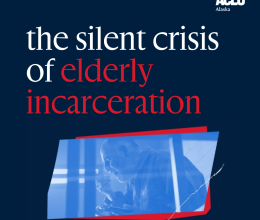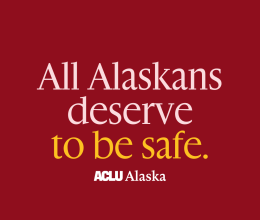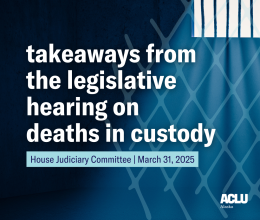
The following was published as an opinion editorial by Doron Levine, the ACLU of Alaska's Prison Project Intake Attorney in the Anchorage Daily News on September 13, 2025. The original piece can be found here.
Our criminal legal system is supposed to hold people accountable. If done right, accountability can repair relationships, build trust, help people learn from mistakes and make our community safer. But this only works if the people in charge lead by example. Accountability has to start at the top.
A recent incident at the Alaska State Fair shows the importance of leading with accountability. In late August, an Alaska fairgoer captured video footage of three Palmer police officers violently arresting an unarmed man. He had been charged with a misdemeanor crime back in February. His case was still pending in August, six months later. Two weeks before he went to the fair, he missed a routine pretrial hearing, and the judge issued a warrant for his arrest.
When the officers learned he had a warrant for missing a hearing, they grabbed his child from his arms, tackled him in a chokehold, punched him repeatedly, and tasered him in the back as he lay on the ground with his hands up, screaming in pain.
If a non-officer were caught assaulting a defenseless person, the likely result would be as follows: the police would cuff them, put them in a police car and book them at Mat-Su Pretrial jail. Then, they would stay locked up until they could pay enough money to get out. If released, they’d probably have to wear an ankle monitor. And they would have to come to the Palmer Courthouse every few weeks for a pretrial conference hearing.
No officers were arrested for this incident. Instead, the day after, the Palmer Police Department announced that their administration will be “conducting a review” of what happened. But when an agency investigates itself, it raises the very real possibility of a conflict of interest. The department’s press release underscores this problem. Two days after the incident, the department issued a press release which said that, during the arrest, the man and two officers “went to the ground.” It failed to mention the chokehold, punching, and tasering, let alone that the man was on the ground with his hands up when the officers tasered him.
More arrests are not necessarily the answer. A punitive response won’t rebuild community trust. But we need accountability. Palmer Police should seek an independent investigation — by people outside the department — to give this problem a full factual airing, not one that omits key details.
An independent investigation could objectively evaluate the policies, training, and culture at the Palmer Police Department that precipitated this incident. It would help the community understand why a public arrest over a missed pretrial hearing so quickly devolved into violence. With this knowledge in hand, the community could begin to rethink police practices and policies, improve training for officers, reduce violent behavior, rebuild trust, and make the Valley a safer place to live.
An independent investigation would be a helpful blueprint for our prisons, which suffer similarly from a lack of accountability to the public. Most Alaskans, including the judges and prosecutors shaping prison sentences, know little about life inside Alaska prisons. For example, years of improper medical care leading to injury, disfigurement, and death have plagued our prison system. Joshuah Paul Keeling was in prison less than a day before he died on Sept. 6 at age 35. He was the 13th person to die in Alaska prisons so far this year. But the culture of unaccountability within our prisons keeps the public in the dark and prevents us from demanding the necessary changes.
The lack of transparency means that judges frequently sentence people to years in prison without knowing if they’ll be denied health care, if they’ll have access to rehabilitative and vocational programs, or if they’ll be in solitary confinement for months or years. If the Alaska public — and the Legislature that sets sentencing ranges — learned about these conditions firsthand, we could begin to craft solutions that make prison sentences more accountable to prison realities. We need to honestly confront the failures of our criminal legal system — from police, to pretrial, to prisons — not shy away from them.
This is not about blame. It’s about trust, personal growth and a positive approach to public safety. If our criminal legal system is really for holding people accountable, then from our small-town police departments to the prisons we funnel thousands of Alaskans into every year, we must have mechanisms to hold our leaders and institutions accountable too.
Alaska has a lot of work to do to improve its criminal legal system. Taking accountability is the first step.

